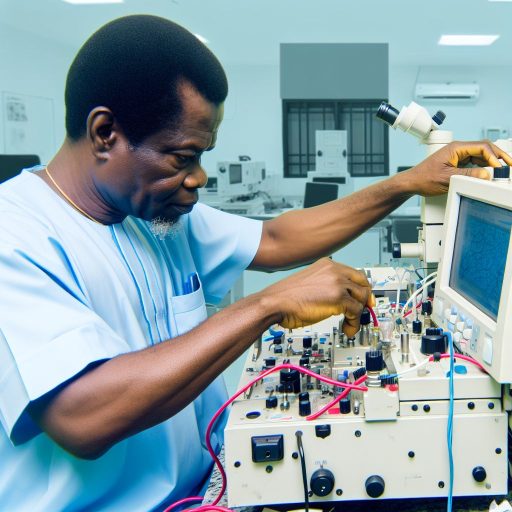Introduction:
Biomedical technology is crucial in Nigeria for advancing healthcare and research.
Government policies play a significant role in shaping the development of biomedical technology.
Current state of biomedical technology in Nigeria:
Nigeria’s biomedical technology infrastructure is limited and underdeveloped.
Lack of resources such as advanced equipment and trained personnel hinders progress.
Overview of the existing infrastructure and resources:
- Most healthcare facilities in Nigeria lack access to modern biomedical technologies.
- The equipment available is often outdated and inadequate for proper diagnosis and treatment.
- Medical personnel have limited training on using advanced tools and technologies effectively.
- Research and development in biomedical technology are minimal due to funding constraints.
- The lack of infrastructure and resources limits innovation and progress in the healthcare sector.
Discussion on the challenges faced by the healthcare sector in adopting advanced technologies:
- Cost is a major barrier as purchasing and maintaining advanced biomedical equipment is expensive.
- Lack of government investment in healthcare infrastructure further hampers technology adoption.
- Inadequate training programs for medical professionals on using new technologies efficiently.
- Limited public awareness and access to information about the benefits of advanced biomedical technologies.
- Regulatory hurdles and bureaucracy make it difficult to introduce and implement new technologies.
Recommendations for improving biomedical technology in Nigeria:
- Increase government funding for healthcare infrastructure and technology acquisition.
- Develop training programs to enhance the skills of medical professionals in using advanced tools.
- Encourage public-private partnerships to promote innovation and technology adoption.
- Create awareness campaigns to educate the public on the importance of advanced biomedical technologies.
- Streamline processes for regulatory approval of new technologies to expedite implementation.
Government policies promoting biomedical technology:
Analysis of existing policies and initiatives aimed at improving healthcare through technology.
The Nigerian government has recognized the importance of biomedical technology in enhancing healthcare delivery.
Through strategic policies and initiatives, the government aims to leverage technology to address healthcare challenges.
The National Health Act of 2014 includes provisions for promoting the use of technology in healthcare.
Case studies of successful implementation of government programs in the field:
The implementation of the National Health Information System (NHIS) has improved data collection and management.
The introduction of telemedicine services in rural areas has increased access to healthcare for underserved populations.
The establishment of the National Biotechnology Development Agency (NABDA) has supported research and development in biomedical technology.
Gain More Insights: Blood Transfusion FAQs for Nigerian Patients
Barriers to the Effective Implementation of Policies
One of the factors hindering the successful integration of biomedical technology in Nigeria is the lack of adequate funding.
Without sufficient financial resources, it becomes challenging to procure necessary equipment and conduct research and development in this field.
Government funding for biomedical technology projects is often limited, leading to a lack of investment in innovative solutions and advancements.
Additionally, the absence of a dedicated budget for healthcare technology hinders progress in this crucial sector, impacting the quality of healthcare services.
Another barrier to effective policy implementation is the inadequate infrastructure to support the growth and utilization of biomedical technology in Nigeria.
Without proper facilities and equipment, healthcare providers struggle to implement new technologies effectively, limiting their impact on patient care.
The lack of infrastructure also extends to medical research and development institutions, which face challenges in conducting cutting-edge studies without the necessary resources.
Furthermore, the scarcity of skilled professionals and expertise in biomedical technology poses a significant obstacle to the successful implementation of policies in Nigeria.
With a shortage of qualified personnel in this field, healthcare institutions struggle to adopt and utilize new technologies to improve patient outcomes.
The absence of training programs and educational initiatives focused on biomedical technology contributes to the dearth of expertise in the sector, hindering progress and innovation.
Discover More: Impact of Restorative Dentistry on Overall Health
Recommendations for policy improvement:
- Suggestions for enhancing government policies to better support the growth of biomedical technology in Nigeria.
Increased Funding: One of the key recommendations for policy improvement in Nigeria is to allocate more funds towards research and development in biomedical technology. This will enable researchers and scientists to conduct cutting-edge studies and innovate new technologies that can benefit the healthcare sector.
Streamlined Regulatory Processes: The government should streamline the regulatory processes for approving and monitoring biomedical technologies. By creating efficient and transparent approval pathways, manufacturers will be incentivized to invest in developing new products for the Nigerian market.
Capacity Building: Investing in training programs for healthcare professionals and researchers in biomedical technology is crucial for the sector’s growth. By enhancing the skills and knowledge of individuals in this field, Nigeria can build a strong workforce that can drive innovation and contribute to the advancement of healthcare in the country.
Collaboration with Industry Partners: The government should encourage collaborations between academia, industry players, and healthcare providers to foster a conducive environment for research and development. By facilitating partnerships between different stakeholders, Nigeria can leverage the expertise and resources of the private sector to accelerate the growth of biomedical technology.
Proposal for collaborations with international organizations and private sector partners:
- Strategic Partnerships: Nigeria should seek partnerships with international organizations that have expertise in biomedical technology to benefit from knowledge exchange and technology transfer. By collaborating with organizations like the World Health Organization (WHO) or the Bill and Melinda Gates Foundation, Nigeria can access valuable resources and support to address healthcare challenges.
Technology Transfer Agreements: The government should consider entering into technology transfer agreements with private sector partners to facilitate the transfer of technology and expertise in biomedical technology. By leveraging the knowledge and resources of multinational corporations, Nigeria can accelerate the development and adoption of innovative healthcare solutions.
Investment Incentives: Providing investment incentives and tax breaks to private sector partners can attract foreign investors and local entrepreneurs to invest in biomedical technology in Nigeria. By creating a favorable investment climate, the government can stimulate growth in the sector and encourage innovation and entrepreneurship.
Public-Private Partnerships: Encouraging public-private partnerships in biomedical technology can help leverage the strengths of both sectors to address healthcare challenges in Nigeria. By fostering collaboration between government agencies, research institutions, and private companies, Nigeria can pool resources and expertise to develop solutions that benefit the population.
Gain More Insights: Addressing Cleft Lip and Palate in Nigerian Surgeries

Impact of government policies on healthcare outcomes:
Government policies play a crucial role in shaping the healthcare landscape in Nigeria.
The effectiveness of these policies can significantly influence healthcare delivery and patient outcomes.
Evaluation of the effectiveness of government initiatives:
- Assessing the impact of government initiatives is essential to determine their success in improving healthcare delivery.
- Measuring key performance indicators allows policymakers to gauge the effectiveness of their policies in achieving desired outcomes.
- Analyzing the reach of government programs helps in understanding the extent to which healthcare services are accessible to the population.
Analysis of data showing the correlation between policy implementation and health indicators:
- Examining data on health indicators such as mortality rates, life expectancy, and disease prevalence can reveal trends influenced by government policies.
- Comparing health outcomes before and after the implementation of specific policies provides insights into their impact on public health.
- Identifying disparities in health indicators among different regions can highlight areas where policy interventions are most needed.
Government policies have a direct impact on healthcare outcomes in Nigeria.
Evaluating the effectiveness of these policies and analyzing data on health indicators are crucial steps in improving healthcare delivery and patient well-being.
Find Out More: The Role of Technology in Nigerian Ophthalmology Practices
Government Policies Impact on Biomedical Technology
Summary of key points discussed in the blog post: The government policies on biomedical technology in Nigeria are not sufficiently supportive of innovation and growth in the sector.
There is a lack of funding and infrastructure to drive research and development in this critical area.
Call to action for stakeholders to support and advocate for improved government policies in biomedical technology in Nigeria: It is imperative for stakeholders, including researchers, industry professionals, and policymakers, to come together and push for better policies.
This will enable the growth of biomedical technology in Nigeria.
Transform Your Career with Expert Guidance
Get personalized mentorship consulting that’s tailored to your unique path. Our expert advice is actionable and exclusive.
Get StartedLobbying efforts, engaging with policymakers, and raising awareness about the importance of investing in this sector are key.
By working together, we can ensure that Nigeria becomes a leader in biomedical technology.
This will drive progress in healthcare innovation for the benefit of its citizens.
Additional Resources
HEALTH AND BIOMEDICAL SCIENCES DEPARTMENT – FMIST
Clinical Reviews and Opinions – biomedical engineering in nigeria …




